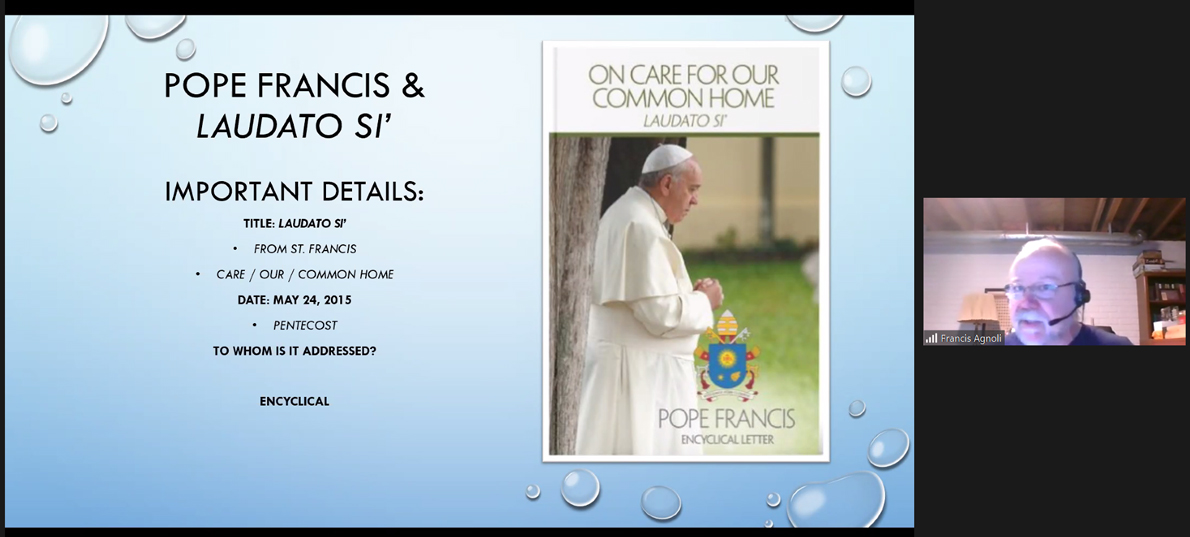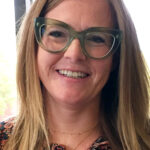
Deacon Frank Agnoli, right, discusses Pope Francis’ 2015 encyclical, Laudato Si, during a Zoom session earlier this month.
By Lindsay Steele
The Catholic Messenger
Pope Francis did not write his 2015 encyclical, Laudato Si, “out of the blue,” said Deacon Frank Agnoli. “It’s standing in a long line of teaching on our responsibility to care for creation… It’s not new teaching. It’s deepening, correcting and building off of tradition.” Laudato Si (Praised Be You) addresses the interconnected relationships between people and God, creation and each other.
Deacon Agnoli, director of Liturgy and of Deacon Formation for the Diocese of Davenport, offered background and analysis of the encyclical during a virtual presentation Sept. 21, hosted by the Social Action Christian Service Group from Our Lady of Victory Parish in Davenport. Laudato Si is “near and dear to my heart,” said Deacon Agnoli.
The fact that Pope Francis addresses the encyclical to “every living person on the planet” sets it apart from the majority of papal writings, Deacon Agnoli said. Typically, papal writings are addressed to the people of the church. The last time a pope wrote to all people of goodwill was Pope St. John XXIII in his 1963 encyclical Pacem in Terris (Peace on Earth), during the height of the Cold War. Both documents express a need for everyone to work together in solving a worldwide crisis.
In the case of Laudato Si, the crisis goes beyond global warming to a variety of issues including a throwaway culture, lack of access to safe water, lack of biodiversity, the decline of human life and breakdown of society, global inequality, weak responses worldwide and a variety of opinions. The environment, economy and society are all connected, and the people who bear the consequences of these issues tend to be the poor and marginalized. “Pope Francis sees this as a human problem, and it crosses boundaries. We need all hands on deck.”
In Laudato Si, Pope Francis draws from a variety of sources, including his papal predecessors since Vatican II. The documents of the Second Vatican Council explained that human beings have a fundamental responsibility to ensure the preservation of the earth and its resources, Deacon Agnoli said. Pope Francis also cites the Catechism of the Catholic Church, bishops’ conferences and other faith traditions around the world. “He sees this as an exercise in dialogue and synodality (walking together).”
Throughout the encyclical, Pope Francis places emphasis on God as creator. “It’s a very Franciscan thing to do,” said Deacon Agnoli, a secular Franciscan. “St. Francis framed his spirituality in terms of fraternity — the familial relationship we have with each other and all of creation.” The pope refers to the earth as “our common home,” since it is common not just to human beings but to plants and animals as well.
The pope is deliberate in referring to the “care of creation” over phrases that express ownership. The earth is “not ours to control, exploit and extract,” Deacon Agnoli explained. Pope Francis “rejects the misguided notion that we are supposed to have mastery over the world which prioritizes immediate conveniences, where decisions come down to ‘what I want when I want it’ without consideration for others.”
Pope Francis stresses the principle of the common good. “The greatest good for the greatest number of people is not what Catholic teaching is,” Deacon Agnoli said. “It’s that we need to make sure everyone has what they need to live a fully human life.”
Solving the issues pointed out in Laudato Si will not be an easy task. As a follow-up to the encyclical, the pope has laid out a seven-year plan (Laudato Si Action Platform) for how different groups of people, from families to major institutions, can consider responding to the challenges presented in Laudato Si. Dialogue will be essential to coming together to ensure people today and in the future can thrive. Pope Francis ends the encyclical with a sense of hope that “the international community will step up to the plate and do what needs to be done.”
After the presentation, webinar participants spent about an hour offering suggestions and sharing personal testimonies. One participant said she would like to see priests address care of creation in homilies. “I think people in pews listen to the priests… I think it’s important that it comes from the top down,” she said.
Glenn Leach, a volunteer for the diocesan Office of Social Action, has read the encyclical twice, but Deacon Agnoli’s presentation offered him a new understanding of the communal aspect of creation. He admitted that he has “a lot of work to do” when it comes to taking personal actions to live more sustainably.
“We don’t have the luxury of despair. We need to act,” said Kent Ferris, diocesan director of Social Action. “We need to come together. We have no choice.”











